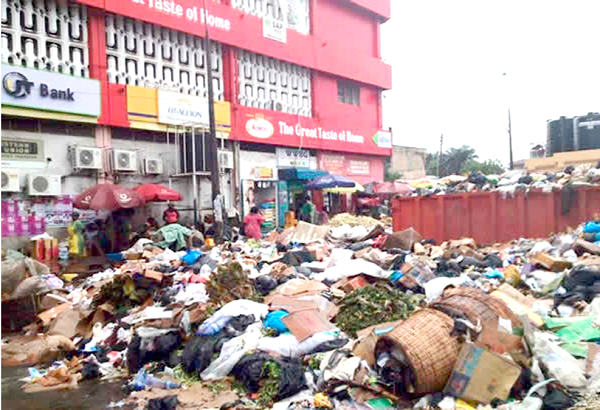
Efforts to eliminate cholera in endemic areas - Targeting hotspots with vaccines
It is estimated that 20,000 tonnes of waste is generated in Ghana daily. Accra, the capital city, alone accounts for 3,000 tonnes of the waste.
The waste is in the form of solid, liquid, electronic and plastic, a large amount of which end up in drains, water bodies and open gutters due to poor water and sanitation infrastructural systems.
Advertisement
Due to the government’s inability to clear the waste generated and the lack of proper toilet facilities for many homes, Ghana is always faced with perennial cholera outbreaks.
Cholera

Such filth in the markets are recipe for cholera outbreak
Drinking water contaminated with faeces is the biggest cause of cholera, a disease characterised by vomiting and watery stool. Cholera can lead to death within a few hours.
From June 2014 to the end of that year, Ghana experienced one of its worst cholera outbreaks which left an estimated 218 people dead and a little over 1,000 hospitalised.
Accra alone recorded more than 20,000 cases and 120 deaths, leaving the various health centres overstretched. On the whole, the country recorded 28,178 cases from 130 out of the 270 districts in the country’s 10 regions.
Global burden
According to the World Health Organisation (WHO), cholera is widely underreported, with estimates of the actual global burden going up to four million cases and 143,000 deaths a year. WHO estimates that there are 150,000 infections and thousands of deaths each year around the globe.
Most of these cases are recorded in sub-Saharan Africa where frequent cholera outbreaks are a major source of social and economic disruption.
Recently, two new studies led by scientists at the Johns Hopkins Bloomberg School of Public Health, United States (US), have shown that if interventions are focused in cholera hotspots in endemic countries including Ghana, the number of cases could be reduced by half.
The studies
The two studies both showed that although cholera occurred throughout sub-Saharan Africa, its highest incidence was concentrated in a small proportion of the continent; therefore, prioritising high-risk areas could substantially increase the efficiency of cholera control programmes.
One of the studies published in The Lancet on March 1, 2018 with support from the Bill & Melinda Gates Foundation showed that while cholera was considered endemic in many African countries, most cases of the disease were concentrated in relatively few areas.
The Lancet study outlines where to focus efforts to combat cholera in sub-Saharan Africa which records 1.7 million cases every year. The study found that by targeting oral cholera vaccine (OCV) campaigns to known hotspots, affected countries could eliminate over 50 per cent of the region’s cholera cases.
Using this approach, 38·4 per cent of cholera cases could be prevented by covering 50·8 million people in Somalia, Nigeria, Democratic Republic of the Congo, Sierra Leone and Ghana, which are countries found to record the most cholera outbreak, in sub-Saharan Africa.
The scientists estimated that focusing anti-cholera efforts on these hotspots could reduce the region’s annual burden of the disease by 50 per cent by targeting fewer than five per cent of the districts in these endemic countries.
“To eliminate cholera as a public health problem, we need to target control measures efficiently to those at highest risk,” says Prof. Justin Lessler, an associate professor in the Bloomberg School’s Department of Epidemiology and co-lead author of The Lancet study.
In the other study published on February 27, 2018 in PLoS Medicine, an international scientific journal, a team led by Bloomberg School researchers modelled the rapid targeting of anti-cholera measures, including vaccination, to the areas immediately surrounding cholera victims’ dwellings. Their study also showed that this could be an efficient strategy to limit outbreaks as an alternative or a complement to wider-scale interventions.
Mapping hotspots

when cholera strikes, hundreds are hospitalised
The study identified that “generally, resources to fight cholera, including oral cholera vaccines (OCVs) and funds to build water and sanitation infrastructure, were limited in comparison with the population potentially at risk—including roughly a billion people in sub-Saharan Africa”.
These researchers found that cholera hotspots accounted for most of sub-Saharan Africa’s cholera cases—yet they represented just a tiny proportion, roughly two per cent, of the region’s population. The scientists determined that effectively targeting cholera control efforts to only the worst of these hotspots would cut the region’s cholera burden in half.
The PLoS Medicine study, which was in close collaboration with Médecins Sans Frontières, a team co-led by Prof. Andrew Azman, a research associate in the Bloomberg School’s Department of Epidemiology, showed that OCV appeared to be by far the most effective of other interventions.
“Our findings suggest that case-area targeted interventions are much more resource-efficient and could play an important role in shortening the duration of outbreaks,” Prof. Azman said.
The Director for Enteric and Diarrhoeal Diseases at the Bill & Melinda Gates Foundation, Prof. Anita Zaidi, in an online interview with the Daily Graphic to answer questions on what the study means to Ghana and other developing countries, said: “Essentially, the implication of this study is that our efforts to tackle cholera can be more streamlined, more cost effective and most importantly prevent more cases of cholera than ever before.”
“Preventing cholera outbreaks will save communities money in the long term. Currently, cholera costs the world an estimated $2 billion per year in treatment, hospitalisation costs and related lost productivity from missed work and school,” she added.
She was further of the view that to control cholera, countries such as Ghana must use a multi-pronged approach where in the short term, the OCVs could be deployed to vulnerable communities while in the medium term, investments must be made in the areas of water, sanitation and hygiene services.
She said targeting known cholera hotspots with integrated solutions was far more cost effective than administering vaccines to entire populations, adding that by taking this more refined approach to preventing cholera in known hotspots, we can transform a herculean task into a 100 per cent achievable one.
Ghana’s initiatives

Vacination of people in hotspots can reduce cholera outbreak
As the rainy season is yet to set in this year, the Graphic Communications Group Limited organised a sanitation forum recently in Accra and the Minister of Sanitation and Water Resources, Mr Joseph Kofi Adda, is on record to have said that at the policy level, the ministry was finalising processes for the creation of a national sanitation fund and a national sanitation authority to facilitate efforts being made to manage waste in the country.
Additionally, he said plans were far advanced to recruit sanitation brigades and marshals in the metropolitan, municipal and district assemblies (MMDAs) in an effort to decentralise the battle against filth in the country.
The minister added that although many steps were being taken by the government in the sanitation sector, including the removal of illegal refuse dumps and the initiative to construct 200,000 household toilets this year, there was the need for all to join the campaign to keep the country clean.
To help end the deadly scourge of cholera in sub-Saharan Africa, the WHO-led Global Task Force on Cholera Control has laid out a roadmap for ending cholera as a public health threat by 2030 and access to safe water, appropriate sanitation, and hygiene (WaSH), it said, remained the foundation of sustained cholera control.
Writer's [email protected]




